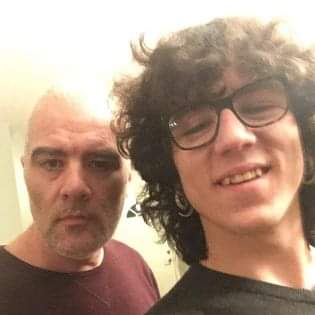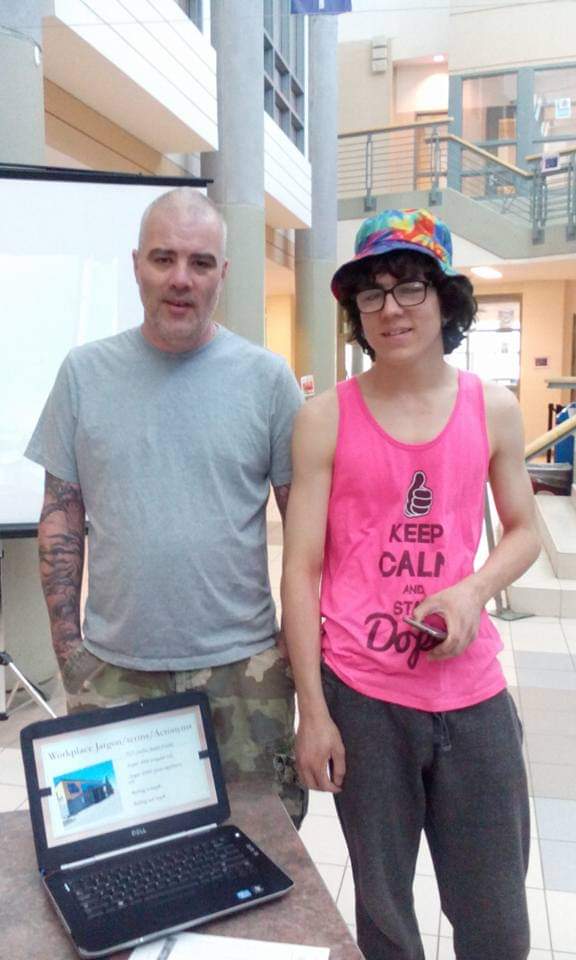Following my interview with Ben, I had a chance to sit down with his parent Dana and get their take on parenting a child on the spectrum while being on the spectrum themselves.
S) As a parent of an autistic child that discovered your own autism after your child’s diagnosis what can you say you have learned about autism throughout the process?
D) With me they (doctors) glossed over it. They basically said any person of autism is either verbal or non-verbal but I felt I needed to understand it more so I got a job working group homes. If you saw what I did in group homes like those I worked in your head would spin. I mean I never saw a resident poorly treated but if a kid acted up they (caretakers) just put a kid in a room and shut the door. How’s a kid gonna learn anything when you just shut the door? They’d just put the kid in the room and leave em there.

S) Sadly this is something of a common experience for a lot of us on the spectrum, especially when diagnosed late in life. Was your own childhood any better than the kind of neglect and the challenges you saw in the group homes?
D) My parents brutalized me in my childhood. I feel like they beat the autism out of me. Now it feels like my autism switches. I feel like I have a grasp on it and then something happens and I feel stupid again. I’m fifty-one and I still get scared, sometimes I just get so scared I won’t leave my basement.
S) Dana brother I am so sorry man. You shouldn’t have gone through that. It’s horrible.
D) Yea. Sometimes I feel like if you and I had different parents things would have been drastically different for us you know?
S) Same with those kids in the group homes?
D) I mean maybe? There are occasions that even I have to admit that it was either they were locked in a room or they would be locked in a jail cell.
S) Mclean’s magazine recently published a story about a large percentage of inmates in Canada likely being autistic in the opinion of experts. The costs must be staggering.
D) See that’s the odd thing, not group homes. We (Dana and his peers) sat down one day with the books and did the math. One kid in a group home in Ontario is worth one hundred and five thousand dollars a year. That’s what a home is making off each child being cared for. They pack em in there. You can’t do that with autistic kids, they need one on one man. In a high school twenty kids might work in a class but a group home? They need to employ people that are more compassionate. My co-workers were good people for the most part but they treated the work like just a job, babysitting, they lacked compassion.
S) Did you try to make up for it in some way? The lack of compassion I mean?
D) Yea man I mean I tried but I didn’t want to push it and get fired or something you know? I had this one kid named Drew I was assigned to. I had him and his father over for Christmas one year and it was clear his father wasn’t really involved. Drew didn’t even know how to open presents. I had to teach him what to do with a gift by opening it and he was over joyed to learn the whole process. I taught him that and other stuff, like how to say hello to people and other life skills he missed cause they would just lock kids like him in a room when they got frustrated.
S) When your son Ben was diagnosed did the doctors tell you much about his challenges or did you learn what you know about your son later? Or from when you were working group homes?
D) Nah my doctor actually filled out stuff for us. I remember my family doctor basically telling me that if the stuff wasn’t filled out exact then the government would likely try to deny Ben the care he needed. We had a couple of sessions with councillors and other experts but not many. I was against giving my son meds cause for Ben it’s like he might have gotten a boost from the meds but they wouldn’t have helped his other challenges. Like I remember telling him “stick up for your friends” and later some dude in his grade stole Ben’s friend’s dollar. Ben said “give it back” but the kid wouldn’t. Ben head butted the kid. My wife was mad as hell at me and told me it was my fault for telling Ben to stick up for his friends. I wouldn’t tell Ben not to stick up for his friend’s cause I think a good man protects those he cares about. I had to teach Ben to try to work around the violence like you and me learned how to do over the years. Teach him how to use his words first and not just haul off and hit someone that had done something wrong to someone.

S) I’ve known you for years and we both know you are on the spectrum, that Ben gets it from you for the most part, were you ever able to get a formal diagnosis?
D) I feel like I’ll be long dead before they finally figure it out. But I don’t mind if I don’t get the help cause my son Ben did. He has done well with work, he has become his own person and his life was better than ours brother.
S) Do you tell your employers or other people about your autistic challenges? In Ben’s inter view he said he stopped telling employers cause he noticed they treated him differently after he made it known.
D) Yea that’s my experience as well. I actually worried about him all the time cause he got picked on about his autism. I didn’t want him being picked on. That’s when I started putting together I was autistic but my folks had beat it out of me and I didn’t know what was what. My dad broke my arm with a wrench one time after I tried to drive the car when I was nine. My mom punched and kicked me, made me swallow soap when I did autistic stuff. The same kind of stuff I noticed Ben would do as a kid. I guess I figured as a kid that I sort of caused it. Now I realized autism causes it.
S) I’m so sorry.
D) Eh, I got therapy and stuff. Didn’t help much, I don’t talk to my folks anymore. As of two years ago I haven’t talked to em.
S) You didn’t get any info from doctors about Ben?
D) The doctors, it’s like they didn’t want me there. They gave the little info we got to my wife. They didn’t want me involved. The little info we got my wife read but it wasn’t a lot. I felt so bad for Ben back then I took him everywhere with me that I could. We’d go to sessions with doctors but they never gave us anything to take home. My wife and I wanted to continue the lessons with Ben at home but the doctors wouldn’t give us anything to take home.
S) Do you have any advice you’d like to impart on parents?
D) Write EVERYTHING down. Get copies from doctors anywhere you can. Some parents, like me, are also autistic like their kids. They need to be told stuff over and over again, keep trying.
Sean Leal is on a mission to advocate both for mental health awareness and for Autism awareness as well as care. After looking back on the tragedy and abuse he suffered in his childhood he spent eight years in therapy and was diagnosed with level one Autism at the age of thirty-two. After his diagnosis other members of his family were tested for ASD as well. His brother, sister and uncle have been formally diagnosed with ASD as well as several of their children.
After helping his family learn more about the Autism spectrum he is very excited to be given the opportunity to volunteer and write for ASO. It is his hope that the book he has written, an autobiography of his life, will one day be published so that he might pursue his dream career of being a writer and published author. He considers his autistic traits to be a gift, they absolutely are the reason he survived what he did and he is proud to be on the spectrum.


